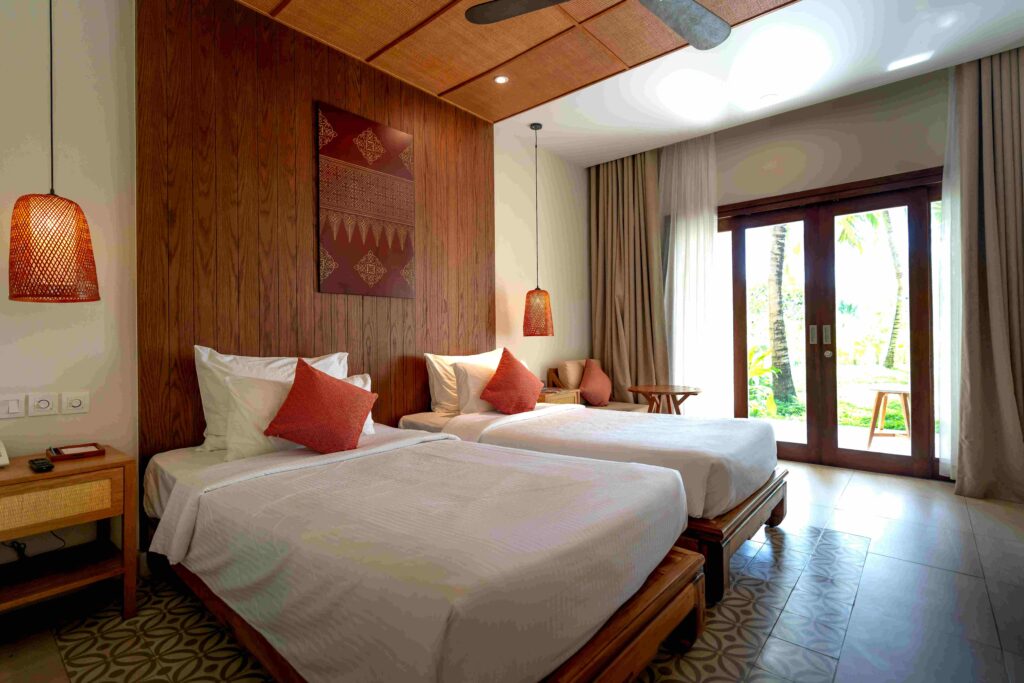Manage Hotels Effectively: Key Tips for Success
Managing hotels effectively is crucial for success in the competitive hospitality industry. Balancing guest satisfaction with operational efficiency requires a strategic approach and the right tools. From automated check-in solutions that streamline the arrival process to personalized guest services that enhance stays, there are numerous strategies available.
This article will provide key tips for hoteliers to manage hotels successfully, focusing on innovative solutions like Chekin’s services. By adopting these practices, hotel managers can ensure a seamless, enjoyable experience for their guests while optimizing their operational processes.
Key tips to manage hotels
Enhance Guest Experience
Personalize Guest Interactions
Personalizing guest interactions can significantly enhance the overall guest experience at your hotel. By understanding guests’ preferences and tailoring services to meet their needs, you can create memorable stays that encourage loyalty and repeat visits. Start by gathering data on guest preferences and past behaviors through your booking system and guest interactions. Use this information to offer personalized recommendations for dining, activities, or room amenities.
Read more about: The best Upselling strategies for your boutique hotel.
Moreover, personalized communication, such as greeting them by name and acknowledging their special occasions, can make a substantial difference. Technology can assist in these efforts by automating data collection and enabling personalized messaging. Tools like Chekin can help automate these processes, making it easier to deliver a consistent, personalized experience.
By focusing on personalization, you enhance guest satisfaction and differentiate your hotel from competitors.
Revolutionize the experience of your guests, increase the benefits of each reservation, get better reviews and get more direct reservations.
Automate Offers and Experiences
Offer Unique Hotel Amenities
In today’s competitive hospitality landscape, offering unique hotel amenities can set your property apart and enhance the guest experience. Consider amenities that align with the interests and needs of your target audience. For instance, wellness-focused travelers might appreciate complimentary yoga classes or access to a state-of-the-art fitness center. Families could benefit from child-friendly services like play areas or babysitting options.
Additionally, sustainability-minded guests might favor eco-friendly amenities such as refillable water stations and biodegradable toiletries. Collaborate with local businesses to provide guests with exclusive experiences, such as guided tours or culinary workshops, highlighting the local culture and scenery.
Technology can play a role, too, with smart room controls or virtual concierge services offering convenience and personalization. By thoughtfully curating your hotel’s amenities to cater to diverse guest preferences, you not only enhance satisfaction and loyalty but also create memorable stays that guests are likely to recommend to others.
Implement Feedback Mechanisms
Implementing effective feedback mechanisms is crucial for enhancing the guest experience and driving continuous improvement in hotel operations. Start by providing multiple channels for guests to share their thoughts, such as in-person conversations, digital surveys, or dedicated feedback forms on your website. Encourage honest and constructive input by ensuring the process is quick and straightforward. Once feedback is collected, analyze it to identify trends and specific areas needing attention. Respond promptly to both positive and negative feedback, demonstrating that guest opinions are valued and taken seriously.
Use technology to automate parts of this process, ensuring no feedback goes unnoticed and that responses are timely. This proactive approach allows managers to implement changes and improvements that reflect guest preferences, ultimately enhancing the overall guest experience and fostering loyalty through transparency and responsiveness.
Optimize Revenue Management
Dynamic Pricing Strategies
Dynamic pricing strategies are essential for optimizing revenue management in the hotel industry. By adjusting room rates in real-time based on demand, competition, and market trends, hotels can maximize revenue and occupancy rates. Start by analyzing historical data and market conditions to predict demand fluctuations. Implement software tools that automatically adjust pricing according to these insights, ensuring your rates remain competitive and attractive to potential guests.
Consider factors like local events, seasonality, and competitor pricing when setting your dynamic pricing rules. Additionally, segment your market to tailor pricing strategies to different customer groups, such as corporate travelers versus vacation families. This approach allows you to capture maximum value from each segment. Regularly review and refine your strategies based on performance metrics and feedback from guests. By leveraging dynamic pricing, hotels can respond swiftly to market changes, optimize their revenue streams, and maintain a competitive edge in the hospitality sector.
Explore Ancillary Revenue Streams
Exploring ancillary revenue streams is a strategic way to bolster a hotel’s financial performance beyond room bookings. Ancillary services can include offering personalized packages, such as spa treatments or dining experiences, that enhance guest satisfaction while boosting income. Additionally, consider leveraging unused spaces for events or co-working areas, which can attract local businesses and travelers alike. Upselling opportunities, like room upgrades or late checkout options (How to Manage a Check Out Late Hotel Effectively), also present simple ways to increase revenue per guest.
More about: 5 Hotel strategies to increase your sales. Do you use any of them?
Collaborate with local attractions or businesses to offer exclusive deals or tours, providing guests with unique experiences that add value to their stay. Implement technology to streamline these offerings; for instance, use apps or websites to promote and manage additional services efficiently. Regularly assess and refine your ancillary offerings based on guest feedback and market trends. By diversifying revenue streams, hotels can mitigate risks associated with seasonal fluctuations and enhance overall profitability while enriching the guest experience.
Enhance Online Booking Systems
Enhancing online booking systems is crucial for optimizing revenue management and improving the overall guest experience. A user-friendly and efficient booking platform can significantly increase direct bookings, reducing reliance on third-party agents and associated commissions. Begin by ensuring your booking system is intuitive, mobile-friendly, and seamlessly integrates with your website. This ease of use encourages potential guests to complete their reservations without frustration. Implement features like real-time availability updates, secure payment options, and instant confirmation emails to build trust and convenience.
Consider offering incentives for direct bookings, such as exclusive discounts or complimentary services, to attract more visitors to your site. Utilize data analytics to track user behavior and identify areas for improvement within your booking process. Regularly update your system to incorporate new technologies, such as AI-driven chatbots for customer queries or personalized recommendations. By enhancing your online booking systems, you can boost conversion rates, increase profitability, and deliver a superior guest experience.
Streamline Operations with Technology
Embrace Automated Check-in Solutions
Embracing automated check-in solutions is a pivotal step in streamlining hotel operations and enhancing guest satisfaction. By adopting systems like Chekin, hotels can offer a seamless, contactless check-in experience that aligns with modern guest expectations. Automated check-in reduces wait times at the front desk, allowing guests to begin their stay without unnecessary delays. This technology also frees up staff to focus on more personalized guest services, increasing overall efficiency.
Additionally, automated systems can integrate with identity verification and online payment processe. Implementing such solutions can lead to significant time savings, as evidenced by hotels that have transitioned from manual to digital processes. Moreover, the convenience of remote access and online check-in options can be particularly appealing to tech-savvy travelers. By embracing automated check-in, hotels enhance operational efficiency, improve guest experiences, and maintain a competitive edge in the hospitality industry.
Free trial for 14 days. No credit card required!
Integrate Property Management Systems
Integrating Property Management Systems (PMS) is essential for streamlining hotel operations and ensuring seamless service delivery. A robust PMS consolidates various functions, such as reservations, billing, and housekeeping, into a single platform. This integration facilitates real-time data sharing across departments, minimizing errors and improving coordination. For instance, front desk staff can instantly access guest preferences, while housekeeping receives timely updates on room status. This level of efficiency not only enhances operational workflow but also boosts guest satisfaction by ensuring their needs are met promptly.
Discover more about: Why the use of a good and innovative PMS is essential for your hotel?
Utilize Data Analytics for Insights
Utilizing data analytics is critical for gaining insights that drive efficient hotel operations and strategic decision-making. By analyzing data from various sources, such as guest feedback, booking patterns, and operational metrics, hotels can uncover trends and areas for improvement. This approach enables managers to make informed decisions about pricing strategies, marketing efforts, and resource allocation. For example, data analytics can reveal periods of high and low demand, guiding revenue management strategies to optimize pricing and occupancy.
Additionally, understanding guest preferences and behavior allows for personalized marketing campaigns and service enhancements that boost guest satisfaction and loyalty. Implementing data analytics tools that integrate with your existing systems can streamline the process of data collection and analysis, providing real-time insights that are actionable. By leveraging data analytics, hotels can enhance operational efficiency, improve the guest experience, and maintain a competitive advantage in the evolving hospitality landscape.
Conclusion
In conclusion, effective hotel management hinges on a strategic blend of optimizing operations, enhancing guest experiences, and leveraging technology. By embracing automated check-in solutions and integrating comprehensive property management systems, hotels can streamline processes and free up staff to focus on personalized guest service. Implementing dynamic pricing strategies and exploring ancillary revenue streams not only maximizes profitability but also creates value-added experiences for guests.
Additionally, utilizing data analytics provides actionable insights that inform decision-making and strategy development. These approaches ensure that hoteliers remain agile in a competitive market, continuously adapting to evolving guest expectations and industry trends. Ultimately, by adopting these key tips and leveraging innovative technologies like Chekin, hotel managers can enhance operational efficiency, boost revenue, and deliver exceptional guest experiences. This balanced focus on operational excellence and guest satisfaction positions hotels for sustainable success in the dynamic hospitality sector.
Get in touch with our sales, partnerships and support teams for product questions, integration support, demos and more.






